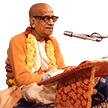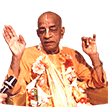One With God - an essential subject: Difference between revisions
Nayanranjani (talk | contribs) (Created page with "Category:Essential Subjects <!----------------------- edit below this line -----------------------> <!------------------------ begin introduction text below ------------...") |
(Vanibot #0041: Moves Choose Another box to the end) |
||
| Line 2: | Line 2: | ||
<!----------------------- edit below this line -----------------------> | <!----------------------- edit below this line -----------------------> | ||
<!------------------------ begin introduction text below ------------------------> | <!------------------------ begin introduction text below ------------------------> | ||
Becoming one with God is a rather contested spiritual topic, especially in Hinduism, where various cults which preach differing philosophies have emerged through the years. The Mayavadi philosophy states that the ultimate goal of life is to merge into the energy of God (the Brahman effulgence), while proper studies and analyses of the Vedas show that the Lord has a personal form. Although merging into the Brahman effulgence means that one has crossed this material sky, it does not guarantee that one will remain there forever, because there is a place much higher than that in the spiritual world - the abode of the Supreme Personality of Godhead where one need never fear falling down into this material world again, and where oneness with God is derided as nonsense due to our constitutional positions as servants of Lord Krishna. | |||
Srila Prabhupada's books, lectures, conversations and letters offer a comprehensive presentation of this essential subject as seen in the Vaniquotes '''[[Vaniquotes:Category:One With God|One With God]]''' category. An introduction from his books is given below in the following | Srila Prabhupada's books, lectures, conversations and letters offer a comprehensive presentation of this essential subject as seen in the Vaniquotes '''[[Vaniquotes:Category:One With God|One With God]]''' category. An introduction from his books is given below in the following 8 quotes. | ||
<!-------- end introduction text and don't touch next three lines ---------> | <!-------- end introduction text and don't touch next three lines ---------> | ||
== Quotes from Srila Prabhupada's books == | == Quotes from Srila Prabhupada's books == | ||
<!----------------- edit quote boxes below this line -----------------> | <!----------------- edit quote boxes below this line -----------------> | ||
{{VaniQuotebox| | {{VaniQuotebox|A pure devotee of the Lord is also not affected by the modes of nature. That is the primary qualification for being one with the Lord. A person who is able to attain this transcendental qualification is called jivan-mukta|One has to transcend the mode of goodness also and be situated in unalloyed goodness, unaffected by any of the qualities of material nature. This stage of transcendental qualification is called śuddha-sattva, or vasudeva, and in this stage the science of God can be realized. As the Lord is not affected by the modes of material nature, so a pure devotee of the Lord is also not affected by the modes of nature. That is the primary qualification for being one with the Lord. A person who is able to attain this transcendental qualification is called jīvan-mukta, or liberated, even though he is apparently in material conditions. '''(Śrīmad-Bhāgavatam 3.4.31)'''}} | ||
{{VaniQuotebox| | {{VaniQuotebox|A pure devotee, as will be explained by Kapila Muni, does not aspire for any of the five liberations. He especially despises as hellish the idea of becoming one with the Supreme Personality of Godhead|There are five kinds of liberation stated in the scriptures. One is to become one with the Supreme Personality of Godhead, or to forsake one's individuality and merge into the Supreme Spirit. This is called ekātmatām. A devotee never accepts this kind of liberation. The other four liberations are: to be promoted to the same planet as God (Vaikuṇṭha), to associate personally with the Supreme Lord, to achieve the same opulence as the Lord and to attain the same bodily features as the Supreme Lord. A pure devotee, as will be explained by Kapila Muni, does not aspire for any of the five liberations. He especially despises as hellish the idea of becoming one with the Supreme Personality of Godhead. '''(Śrīmad-Bhāgavatam 3.25.34)'''}} | ||
{{VaniQuotebox| | {{VaniQuotebox|Although Mayavadis may be honored at first as very learned scholars, ultimately they descend to physical activities of politics, social work, etc. Instead of becoming one with the Supreme Lord, they again become one with these material activities|The Māyāvādīs are called aviśuddha-buddhayaḥ, or unclean in knowledge. Because they are unclean in knowledge, all their austerities and penances end in frustration. Thus although they may be honored at first as very learned scholars, ultimately they descend to physical activities of politics, social work, etc. Instead of becoming one with the Supreme Lord, they again become one with these material activities. '''(Caitanya-caritāmṛta, Ādi-līlā 7.114)'''}} | ||
{{VaniQuotebox| | {{VaniQuotebox|As soon as a living entity forgets his constitutional position and endeavors to become one with the Supreme, his conditional life begins|As soon as a living entity forgets his constitutional position and endeavors to become one with the Supreme, his conditional life begins. The conception that the Supreme Brahman and the living entity are equal not only in quality but also in quantity is the cause of conditional life. '''(Śrīmad-Bhāgavatam 6.16.57)'''}} | ||
{{VaniQuotebox| | {{VaniQuotebox|Bhakti, or devotional service to the Lord, means to become free from material entanglement and then to enter into the kingdom of God, becoming one like Him|As no layman can separate butter from milk, no one can extricate the merged self from matter by acquiring some material qualification. This viśate by devotion (bhaktyā) means to be able to participate in the association of the Lord in person. Bhakti, or devotional service to the Lord, means to become free from material entanglement and then to enter into the kingdom of God, becoming one like Him. Losing one's individuality is not the aim of bhakti-yoga or of the devotees of the Lord. '''(Śrīmad-Bhāgavatam 2.6.35)'''}} | ||
{{VaniQuotebox| | {{VaniQuotebox|To claim to be one with the cosmic consciousness of the Lord is the last trap set by the illusory energy, or daivi maya|The example of the sky within the pot and the sky outside the pot may be helpful to the student for his realization of the all-pervading quality of the cosmic consciousness of the Absolute Truth. But that does not mean that the individual part and parcel of the Lord becomes the Supreme by a false claim. It means only that the conditioned soul is a victim of the illusory energy in her last snare. To claim to be one with the cosmic consciousness of the Lord is the last trap set by the illusory energy, or daivī māyā. '''(Śrīmad-Bhāgavatam 2.9.33)'''}} | ||
{{VaniQuotebox| | {{VaniQuotebox|One must know that he is finite and that the Lord is infinite. Thus it is not possible to actually become one with the Lord even if one aspires for this|The perfect spiritual concept of life is complete knowledge of one's constitutional position, in which one knows enough to dovetail himself in the transcendental loving service of the Lord. One must know that he is finite and that the Lord is infinite. Thus it is not possible to actually become one with the Lord even if one aspires for this. '''(Nectar of Devotion, Chapter 3)'''}} | ||
{{VaniQuotebox| | {{VaniQuotebox|When the mind is in touch with the impersonal Brahman one becomes satisfied, but one must advance further to render service to the Supreme Personality of Godhead, for one's remaining merged in the Brahman effulgence is not always assured|Contact with Kṛṣṇa is perfect brahma-sukha. When the mind is in touch with the impersonal Brahman one becomes satisfied, but one must advance further to render service to the Supreme Personality of Godhead, for one's remaining merged in the Brahman effulgence is not always assured. '''(Śrīmad-Bhāgavatam 7.7.37)'''}} | ||
<!----------------- edit quote boxes above this line -----------------> | <!----------------- edit quote boxes above this line -----------------> | ||
| Line 30: | Line 30: | ||
'''One With God - [[Vaniquotes:Category:One With God|explore more within this category]]'''. | '''One With God - [[Vaniquotes:Category:One With God|explore more within this category]]'''. | ||
{{EsentialSubjectTotal}} | {{EsentialSubjectTotal}} | ||
<div style="float:left;"> | |||
{{EssentialSubjectnav}} | |||
</div> | |||
__NOTOC__ | __NOTOC__ | ||
__NOEDITSECTION__ | __NOEDITSECTION__ | ||
Latest revision as of 17:03, 22 November 2020
Becoming one with God is a rather contested spiritual topic, especially in Hinduism, where various cults which preach differing philosophies have emerged through the years. The Mayavadi philosophy states that the ultimate goal of life is to merge into the energy of God (the Brahman effulgence), while proper studies and analyses of the Vedas show that the Lord has a personal form. Although merging into the Brahman effulgence means that one has crossed this material sky, it does not guarantee that one will remain there forever, because there is a place much higher than that in the spiritual world - the abode of the Supreme Personality of Godhead where one need never fear falling down into this material world again, and where oneness with God is derided as nonsense due to our constitutional positions as servants of Lord Krishna.
Srila Prabhupada's books, lectures, conversations and letters offer a comprehensive presentation of this essential subject as seen in the Vaniquotes One With God category. An introduction from his books is given below in the following 8 quotes.
Quotes from Srila Prabhupada's books
One With God - explore more within this category.
Vanipedia has now over 903 introductory articles compiled from Srila Prabhupada's books under the series titled Essential Subjects. All these articles can be seen in the Table of Content on the right side of this article and also here in this Umbrella Category. Browse through them to relish the breadth and depth of Srila Prabhupada's teachings - There is a subject for everyone.







